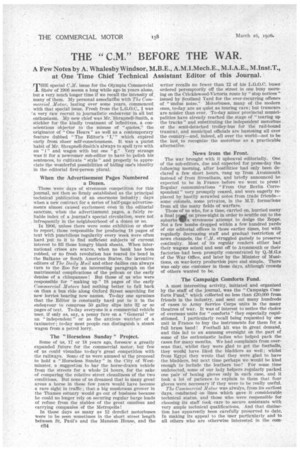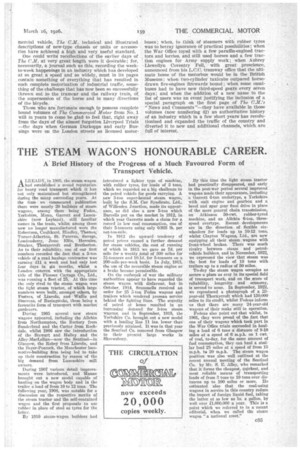THE " C.M." BEFORE THE WAR.
Page 40

Page 41

If you've noticed an error in this article please click here to report it so we can fix it.
A Few Notes by A. Whalesby Windsor, M.B.E., A.M.I.Mech.E., M.I.A.E., M.Inst.T., at One Time Chief Technical Assistant Editor of this Journal.
THE special C.M. issue for the Olympia Commercial Show of 1906 seems a long while ago in years alone, but a very much longer time if we recall the intensity of many of them. My personal assoclattn with The Commercial. Motor, lasting over some years, commenced with that special issue. Fresh from the L.G.O.C., I was 'a very raw recruit to journalistic endeavour in all but enthusiasm. My new chief was Mr. Shrapnell-Smith, a stickler for the kindly treatment of infinitives, a conscientious objector to the misuse of " quotes," the originator of "One Hears" as well as a contemporary feature dubbed "The Editor's 'I,'" which expired early from sheer self-consciousness. It was a purist habit of Mr. Shrapnell-Smith's always to spell tyre with an "I " and wagon with but one "g." Very strange was it for a newcomer sub-editor to have to polish his sentences, to cultivate " style" and properly to appreciate the wonderful possibilities of hiding one's identity in the editorial first-person plural.
When the Advertisement Pages Numbered a Dozen.
Those were days of strenuous competition for this journal, not then so firmly established as the principal technical publication of an enormous industry ; days when a new contract for a series of half-page advertisements almost caused excitement even in the editorial sanctum, when the advertisement pages, a fairly reliable index of a journal's special circulation, were not infrequently in the neighbourhood of a dozen or so.
In 1900, unless there were some exhibition or show to report, those responsible for producing 18 pages of text with punctilious regularity every week were often hard put to it to find sufficient subjects of current interest to fill those hungry blank sheets. When international crises are scarce, when no bank has been robbed, or no fresh revolution has reared its head in the Balkans or South American States, the inventive editors of The Daily Mail and other dailies can always turn to the Zoo for an interesting paragraph on the matrimonial complications of the pelican or the early demise of a chimpanzee! But those of us who were responsible for "making up" 18 pages of the early Commercial Motors had nothing better to fall back on than a bus ride along Oxford Street searching for new lorries bearing new names. To-day one surmises that the Editor is constantly hard put to it in the endeavour to compress 50 galley slips into 32 or so pages of text. To-day everyone is a commercial vehicle user, if only as, say, a penny fare on a " General " or an" independent " or as the anxious watcher of a taximeter ; to-day most people can distinguish 'a steam wagon from a petrol lorry.
The " Horseless Sunday" Project.
Some of us, 17 or 18 years ago, foresaw a greatly expanded future for the commercial motor, but few of us could visualize to-day's great competition with the railways. Some ef us were amused at the proposal to hold a " Horseless Sunday" in the City of Westminster, a suggestion to bar the horse-drawn vehicle from the streets for a whole 24 hours, for the sake of comparing the relative street cleanliness of the two conditions. But none of us dreamed that in many great areas a horse in these few years would have become a rare sight in traffic; that a big mushroom grower in the Thames estuary would go out of business because he could no longer rely on securing regular barge loads of refuse from the stables of the great omnibus and carrying companies of the Metropolis!
In those days as many as 12 derelict motorbuses we're to be seen sometimes in the short street length between St. Paul's and the Mansion House, and the c34 writer recalls no fewer than 12 of his L.G.O.C. buses ordered peremptorily off the street in one busy morning on the Cricklevvood-Victoria route by "stop notices" issued by Scotland Yard for the ever-recurring offence! of "undue noise." Motorbuses, many of the modern ones, to-day are as quiet as touring cars; but tramcars are noisier than ever. To-day minor provincial municipalities have already reached the stage of "tearing up the tracks" and substituting the independent motorbus or the semi-detached trolley-bus for the rail-bound tramcar, and municipal officials are hastening all over the country—and, indeed, all over the world—not to be the last to recognize the motorbus as a practicable alternative.
News from the Front.
The war brought with it upheaval editorially. One of the sub-editors, due and expected for press-day the following morning, after hostilities had only been declared a few short hours, rang up -from Avonmouth instead of from Streatham, and briefly announced he expected to be in France before we went to press! Regular communications "From Our Berlin Correspondent" very promptly ceased, and were eagerly replaced by hastily scrawled notes from trade friends— some colonels, some privates, in the M.T. formations from all the many fields of warfare.
Those of us who, for a time, carried on, hurried many a final pgiii on press-night in order to scuttle out to the suburbs 'pa strenuous attempt to dodge the Zepps. Not a few bombs dropped within a few hundred yards of our editorial offices in those earlier times, but with regularly decreasing staff and gradual restriction of news channels, the C.M. struggled gamely to preserve continuity. Most of its regular readers either had their wagons seized and sent off to Avonmouth or their factories had been promptly concentrated by Q.-M.G.s of the War Office, and later by the Minister of Munitions, on war-lorry production pure and simple. There was only one customer in those days, although crowds of others wanted to be.
The Campaign Comforts Fund.
A most interesting activity, initiated and organized by the staff of the journal, was the "Campaign Comforts Fund," which collected no less than £20,000 from friends in the industry, and sent out many hundreds of cases to Army Service Corps units in the many theatres of war. It was of interest to notice the choice of overseas units for " comforts" they especially requisitioned. I particularly recall being requested by one unit in France to buy the instruments for them for, a full brass band ! Football kit was in great demand, and this led to an amusing oversight on the part of some of the enthusiastic ladies who helped pack the cases for many months. We had complaints from overseas that, whilst they were glad to get the footballs, they would have liked the bladders as well; whilst from Egypt they wrote that they were glad to have the bladders, but next time perhaps we would be kind enough to include the leathers too! For some time undetected, some of our lady helpers regularly packed one pair of boxing gloves only in each case, and it took a lot of patience to explain to them that four gloves were necessary if they were to be really useful.
The Commercial Motor was alwa'ys, from its earliest days, conducted on lines which gave it considerable technical status, and those who were responsible for choosing ;its staff took care to secure assistants with very ample technical qualifications. And that distinction has apparently been carefully preserved to date. In making its appeal to the user particularly and to all others who are otherwise interested in the corn mercia1 vehicle, The C.M. technical and illustrated descriptions of new-type chassis or units or accessories have achieved a high and very useful standard.
One could write recollections of the earlier days of The C.M. at very great length were it desirable; for, necessarily, a journal such as this, recording the weekto-week happenings in an industry which has developed at so great a speed and so widely, must in its pages contain something of everything that has resulted in such complete motorization of industrial traffic, something of the challenge that has now been so successfully thrown out to the tramcar and the railway train, of the supersession of the horse and in many directions of the bicycle, Those who are fortunate enough to possess complete bound volumes of The Commercial Motor from No. 1 will in years to come be glad to feel that, right away from the days of the almost forgotten Liverpool Trials —the days when German Durkopps and early Bussings were on the London streets as licensed motor buses ; when, to think of steamers with rubber tyres was to betray ignorance of practical possibilities; when the War Office toyed with a few paraffin-engined tractors and lorries, and still used -horses and a few traction engines for Army supply work; when Aubrey -Llewellyn Coventry Fell, with great prescience, announced from his L.C.C. tramway office that the ultimate home of the motorbus would be in the British Museum: when two-cylinder taxicabs outpaced horsedrawn fire-engines firewards bound; when some omnibuses had to have new third-speed gears every seven days; and when the addition of a new name to the list of users was an event justifying the inclusion of a special paragraph on the first page of The C.M.'s
News and Comments "—they have available in those volumes (now numbering 42) an authoritative history of an industry which in a few short years has revolutionized and expanded the traffic of the country and diverted it to new and additional channels, which are full of interest.


























































